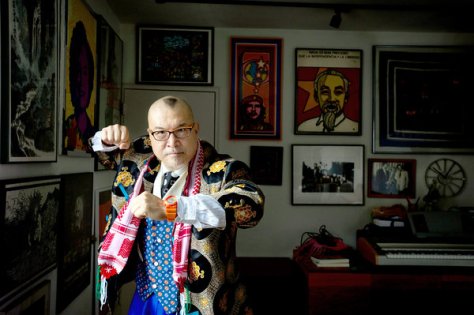
“After growing up alien in a black-and-white world, we founded the home/land we never had and gave birth to ourselves as Asian Americans – a political identity based in the alternative universe of the Third World. As part of the worldwide revolution, we said puckyooo to racism, to imperialism, to assimilation, to white standards, to a failed democracy [America], to our own internalized boundaries and barriers, to everything that had kept us distanced from out sovereignty of our communal selves. And with this new voice we created a new world. With the power of new conciseness and new language, and ample doses of audacity and naivety, we created a new sense of community and culture with few resources and no experience – because until then we had nothing to lose.”
Hulk yeurgh! A rousing & extremely expansive account of “the dragon’s angle” on American counter culture, protest & socio-political turbulence during the 60s & 70s (& thereafter) along with a massively invigorating shot of yellow fuckin’ power activism & identity aggitation.
Delicacy.

A huge list of contributors & archival ingredients assembled by Ishizuka deliver a stuffed banquet, spilling over with a minor detonation of largely hidden frontline experiences from the Asian perspective (we could of done with a bit more on the Korean communities though).
Even for readers with no shared interest or predisposition for yellow power or Asian American politics, Serve the People fluoresces hard in it’s richly detailed research of the era’s protest movements, grassroots campaigns, moral & cultural sentiment & strategies, revolutionary fervency & the collective conflict of citizens vying for a better world through direct action.

Yellow Power is constantly diminished, or more routinely – flat-out ignored, despite being an area of tremendous significance both within America & outside of it.
in terms of imperialist US military foreign aggression, Asia as a region has perhaps an unmatched bodycount from the mass of invasions & large scale military occupations & incursions, not to mention the nuclear slaughter of Hiroshima & Nagasaki.

The intensity of racism directed at “yellow people” that was permitted to flourish during the atrocity of the Vietnam war, & the subsequent explosion of warcrimes this deliberation delivered, still remain unaddressed in many dimensions.
This rarely discussed facet is just one of the many experiences examined in the research, as many other strangely isolated events & cultural phenomena are intensely scrutinised & debated by those affected.

There is still such a heavy lid on this stuff … not just the common narrative, that clearly operates a quietly exclusionary & muting policy towards this history, but also from a large section of the Asian generations that followed, who perhaps subscribed to a dislocation from these immense travails in pursuit of acceptance & assimilative activity.

This apolitical posture or habit fits very well with the erasure or divorce that is prescribed & encouraged, with business & academia being the substitute equaliser to resolve or somehow salve the historic crimes, injustice, racism & oppression.
Conquer the mind, not just the land.

& naturally, an extending arm of unity from the Asian quarter with other dissenters & activists is the most terrifying scenario for the machine, as solidarity & cross-cultural/multi-racial support & unification is their worse case scenario.
Fred Ho features in a few chapters of Serve the People. This badly neglected revolutionary is a terrific example of the kind of radical art & politics that blossomed in this sphere, an energy & statement that resulted in serious career suppression of this great artist & personality.

Many, many others are interviewed in this book, it is a real wealth of testimonials, deconstruction, hidden history, manumission ideals, tribulations in adaption & displacement, & hardcore resistance organisation.
& for anyone interested in historical counter culture & protest movements, or shit-kickin’ 60s ardency, its is over-bubbling with material.
“Okay, here I’m doing art and culture and that’s fine. There’s a role, a place for art and culture. Then I figured, “I want to be a soldier on the front line.” I felt like a war correspondent, you know what I mean? Like I was behind the camera. And that’s okay, but I wanted to be on the front line because I wanted to get them more. I don’t know how to explain it. I just wanted to get them more.” – David Monkawa
Karen Izhizuka, 2016, Verso, 226 pages.
